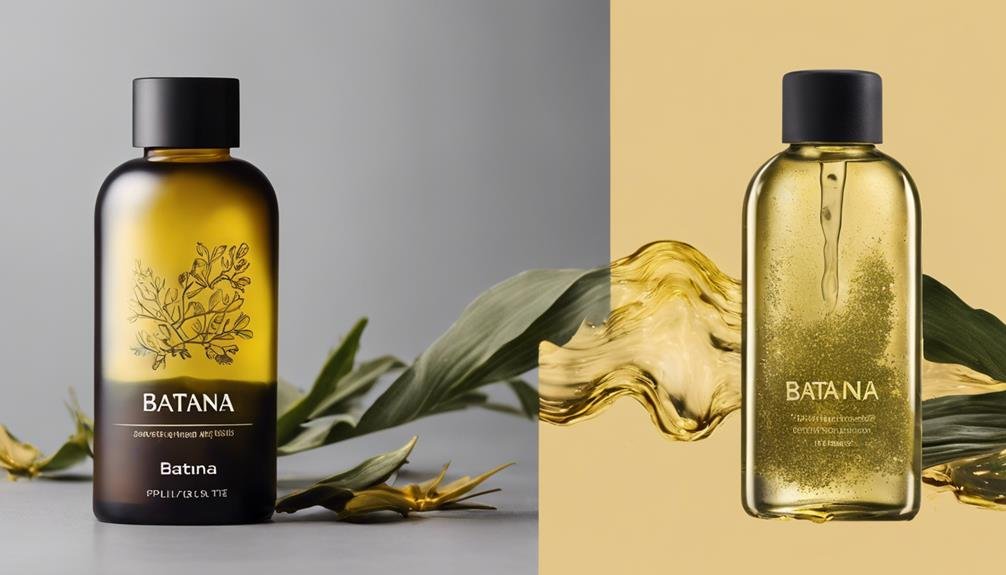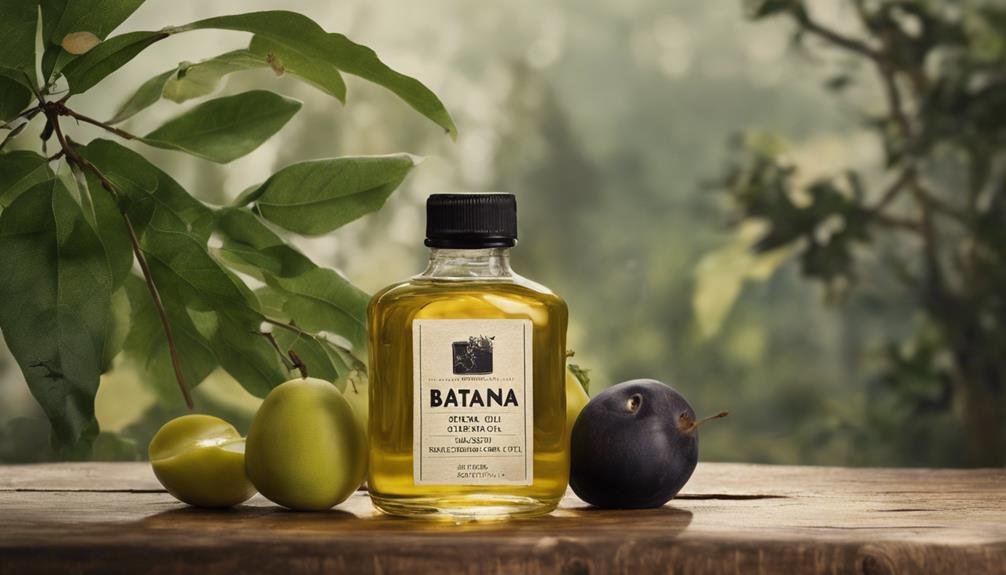When you invest in Batana oil for its acclaimed benefits for your hair and skin, knowing how to spot when it's gone bad is vital. You've probably noticed how great fresh Batana oil can feel, but did you know that its deterioration could not only diminish its efficacy but also harm your skin? Identifying signs like an unusual odor, a change in color, or a strange texture is key. However, there's more to preserving the integrity of this precious oil than meets the eye. Have you ever wondered what specific conditions cause Batana oil to spoil, or how you can guarantee you're buying a high-quality product? Let's explore some essential tips to keep your oil in pristine condition and fully potent.
Key Takeaways
- Identify spoiled Batana oil by its foul smell, discoloration, presence of sediment, or inconsistent texture.
- Store Batana oil in cool, dark places in tightly sealed, dark-colored bottles to avoid spoilage.
- Avoid exposing Batana oil to heat, light, and moisture, which can accelerate oxidation and contamination.
- Purchase Batana oil from reputable sources, checking for clear expiration dates and proper packaging.
- Regularly inspect Batana oil for signs of spoilage and discard immediately if any are detected.
Understanding Raw Batana Oil
Raw Batana oil, extracted from the nuts of the American palm tree Elaeis oleifera, holds a treasure trove of nutrients essential for hair health. This remarkable oil, cherished by the indigenous Miskito people of Honduras, has served as a natural remedy for promoting luscious, healthy locks for centuries. Its unrefined and organic nature guarantees that every drop provides maximum nourishment and deep hydration.
Rich in essential fatty acids, antioxidants, and vitamins A and E, raw batana oil targets the core of hair care issues. You'll find it exceptional in repairing damaged strands, reducing split ends, and enhancing hair thickness and texture.
Unlike many commercially processed oils, raw batana oil maintains its full potency due to its unrefined state, guaranteeing that your hair receives all the benefits it promises.
When you use this oil, you're not just applying a product; you're embracing a centuries-old tradition that respects the bond between nature and personal care. It's a holistic approach to hair health that goes beyond superficial treatment, nurturing your hair from the inside out with every application.
Signs of Spoilage
While raw batana oil offers numerous benefits for hair health, it's important to recognize when this natural product has spoiled to avoid any negative effects. One of the primary indicators of spoilage you'll encounter is a foul or rancid smell, a clear sign of oxidation and degradation. If your oil smells off, it's best to discard it immediately.
Another telltale sign is discoloration. If your batana oil has darkened or turned cloudy, it suggests a loss of quality due to spoilage. Similarly, the presence of sediment or unexpected particles in the oil can indicate contamination or microbial growth, both of which are red flags.
Also, pay attention to the texture of the oil. Any inconsistency, like grittiness or sliminess, may signal that the oil is no longer in good condition. Using compromised oil not only yields ineffective results but could also cause skin irritation.
Always be cautious when purchasing batana oil. Visible indicators of spoilage such as foul smell, discoloration, sediment, or an odd texture are clear signs that the oil has gone bad. Using spoiled raw batana oil can be harmful to your health, as it may contain harmful bacteria or mold. It’s important to carefully inspect the oil before using it in any cooking or beauty applications, and always store it in a cool, dark place to prolong its shelf life. If you suspect that your batana oil has spoiled, it’s best to dispose of it and purchase a fresh bottle to ensure your safety and the quality of your recipes or beauty treatments.
To guarantee the best care for your hair and skin, it's essential to use only high-quality, fresh batana oil.
Spoilage Causes

Understanding why batana oil spoils is important to keeping it effective and safe. To guarantee you're maximizing the beneficial properties of this specialty oil, it's essential to identify the main causes of spoilage.
Here are four key factors that can lead to its degradation:
- Oxidation: When batana oil is exposed to air, oxidation occurs, leading to rancidity. This not only diminishes the oil's quality but also reduces its effectiveness in skin and hair care applications.
- Heat and Light Exposure: Storing batana oil in a warm or brightly lit environment can greatly degrade its quality. It's best to store the oil in a cool, dark place to maintain its integrity and avoid spoilage.
- Moisture: Allowing moisture to come into contact with batana oil can promote microbial growth. This contamination can turn the oil rancid and pose potential health risks.
- Improper Handling and Storage: During transport and after purchase, improper handling and storage can accelerate spoilage. Guaranteeing that the oil is stored properly post-purchase is essential to preserving its quality and extending its shelf life.
Buying Quality Batana Oil
To guarantee you're getting the best batana oil, start by choosing reputable sellers or trusted brands. It's crucial to opt for providers that offer transparent sourcing. This guarantees you're getting a natural product, untainted by harmful additives.
Always check for an expiration date on the bottle. A clear, well-defined date is a good indicator of a high-quality product. Don't overlook the importance of packaging inspection; confirm the container, preferably a dark-colored bottle, is intact and well-sealed to protect the oil from light and prevent oxidation.
Make it a point to read customer reviews. These testimonials can be a goldmine of information, revealing both the effectiveness and any potential issues with the batana oil. They offer a real-world look at how the oil performs and if it lives up to its claims of being a 100% pure and organic ingredient.
Additionally, look for certifications confirming the oil's purity. These labels help you avoid low-quality oils laced with unnecessary chemicals. By following these steps, you'll guarantee you purchase a genuine, high-quality batana oil that delivers all the benefits you expect.
Storage Recommendations

Proper storage is essential for maintaining the quality of your batana oil. To keep your oil in top condition and extend its shelf life, follow these practical storage recommendations:
- Store in a Cool, Dark Place: Keep your batana oil in a cool dark place to prevent oxidation. This helps maintain its quality over time and avoids spoilage signs like discoloration.
- Use Dark-Colored Bottles: Package your oil in dark-colored bottles to shield it from light exposure. Light can degrade the oil's beneficial properties, leading to faster spoilage.
- Keep Tightly Sealed: Always guarantee the bottle is tightly sealed after each use. Minimizing air exposure reduces the risk of rancidity and maintains the oil's integrity.
- Avoid Heat Sources: Place your batana oil away from any heat sources. High temperatures can accelerate spoilage and affect the oil's quality.
Regularly check your oil for any spoilage signs. If you notice foul odors or any discoloration, it's best to discard the oil.
Following these tips will help you preserve your batana oil's beneficial properties and avoid the hassle of dealing with spoiled oil.
Benefits and Uses
Rich in essential fatty acids, vitamins A and E, and antioxidants, batana oil offers numerous benefits for hair and skin health. When you incorporate this natural oil into your daily routine, you're tapping into centuries of indigenous knowledge that recognized batana oil's restorative properties.
It's not just about having good hair days; it's about promoting healthy hair growth and preventing hair loss. With consistent use, you'll notice your hair becoming thicker and stronger. The nourishing properties of batana oil deeply hydrate the scalp and hair strands, preventing split ends and breakage. This means less time worrying about hair damage and more time enjoying the benefits of batana.
The Vitamin E in batana oil also helps in cell regeneration, revitalizing dry, damaged hair and improving its elasticity.
But batana oil isn't just for hair care; it can also improve skin health. Its rich composition supports skin cell repair and hydration, leaving you with a noticeable glow.
If you're looking for a multi-purpose, effective solution to maintain and enhance your natural beauty, batana oil is definitely worth considering.
Handling and Safety Tips

When handling batana oil, it's essential you store it properly to prevent spoilage.
Always keep the oil in a cool, dark environment and make sure the container is tightly sealed after each use.
Recognize the signs of spoilage like a bad smell or change in texture, and don't use the oil if you notice these indicators.
Proper Storage Practices
Storing your batana oil in a cool, dark place is essential to prevent spoilage and maintain its beneficial properties. Proper storage practices are vital for keeping the oil in its best condition.
Here's how you can store batana oil effectively:
- Choose the Right Container: Use dark-colored glass bottles to protect the oil from light and heat, which can accelerate oxidation and spoilage.
- Seal Tightly: Always make sure the bottle is tightly sealed after use. Air exposure can cause the oil to go rancid, losing its beneficial properties.
- Avoid Moisture: When dispensing batana oil, use clean, dry utensils. Moisture can introduce microbes that promote spoilage.
- Location Matters: Keep your oil in a cool, dark cupboard, away from sources of heat like the stove or sunlight from windows.
Recognizing Spoilage Signs
After implementing proper storage techniques for your batana oil, it's equally important to recognize the signs that the oil may no longer be good to use.
First, pay attention to any foul or rancid smell. This unpleasant odor is a clear indicator of spoilage due to oxidation, which drastically reduces the oil's quality. If you detect such a smell, it's best to avoid using the oil.
Next, look out for any discoloration. If your batana oil shows signs of darkening or becomes cloudy, this could suggest spoilage. These changes are warning signs that the oil is possibly unsafe for use.
Similarly, the presence of sediment or unexpected particles in the oil often points to contamination. Such impurities compromise the oil's purity and quality.
Additionally, inspect the oil's texture. Any inconsistency, such as grittiness or sliminess, signals that the batana oil might be spoiled and shouldn't be used.
Regularly checking your oil for these changes can help guarantee you're using a safe, high-quality product. Always prioritize your health by keeping these inspection tips in mind and handling your batana oil with care.
Frequently Asked Questions
Does Batana Oil Expire or Go Bad?
Yes, batana oil does expire and can go bad.
To make certain it stays fresh, check for signs like a rancid smell or discoloration.
Store it in a cool, dark place in a tightly sealed container to extend its shelf life.
Quality indicators like clarity and a mild, characteristic scent suggest good oil.
Be mindful of the production methods and sourcing practices to assure you're using an oil that retains its ingredient benefits.
How to Use Spoiled Batana Oil for Hair?
If you've got spoiled batana oil, don't toss it yet!
You can still use it as a styling aid or for scalp treatments by blending it with other oils. Mix it with fresh oils rich in moisturizing properties to minimize risks.
Apply it sparingly to avoid potential irritation and always do a patch test first. This way, you're still harnessing some hair benefits without wasting the product.
How Do You Know if Hair Oil Has Gone Bad?
To know if your hair oil's gone bad, look for scent changes like a rancid smell.
Notice any color variations or clarity issues and check the texture for consistency changes.
Examine the packaging for signs of breaches and always review the expiration dates.
Poor storage conditions can accelerate spoilage, so keep it in a cool, dry place.
If you see ingredient separation or any residue, it's time to toss it.
How Can You Tell if Batana Oil Is Real?
To guarantee you're getting real batana oil, check for indications of authentic batana sourcing from Honduras, a detail often noted on the packaging.
Authentic oil boasts a deep golden color and a rich, earthy scent, reflecting its natural extraction and nutrient-dense profile.
Always verify the label for a thorough list of batana oil nutrients, like vitamins A and E, which are pivotal in confirming its quality and benefits for skincare.
Conclusion
To guarantee you're getting the most out of your batana oil, always check for signs of spoilage like a bad smell or discoloration before use. Buy from trusted sources and store it properly in cool, dark places. Remember, using spoiled oil can negate its benefits for your skin and hair. Stick to these tips, and you'll keep your batana oil fresh and effective, safeguarding its amazing properties for your beauty routine.

